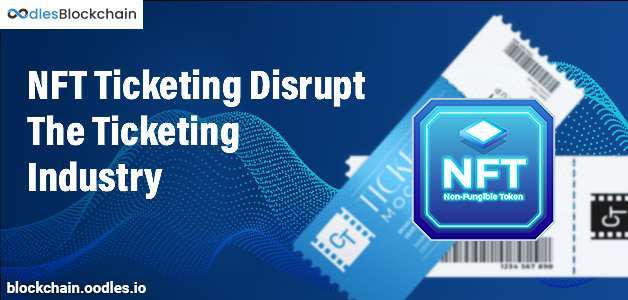-
Although NFTs are transforming many other industries, the event industry is a pioneer in utilizing NFT development services to link physical and digital ticketing.
What is NFT Ticketing
NFTs, an abbreviation for non-fungible tokens, are cryptographic tokens that stand in for particular digital assets. They give us the ability to tokenize physical or digital assets like artwork, valuables, or real estate. They serve as a verifiable form of ownership and authenticity verification because they are kept on a blockchain network. Additionally, an NFT cannot be changed or falsified and can only have one official owner at a time.
NFT tickets are digital possessions that save your event entry information. To further enhance the fan experience, they can also provide ticket holders with extra benefits like meet-and-greets, special goods, and more. NFT tickets can give artists, event organizers, and other stakeholders continuous royalties in addition to improving the relationship with fans.
Also, Read | How NFTs is Revolutionising the Music Industry
How NFTs Influence the Ticketing Industry
The pandemic has helped the ticketing market become sufficiently computerized over the past few years, but it is still extremely centralized, which encourages the development of secondary and underground marketplaces.
The practice of "scalping" involves hoarders purchasing advance tickets to any large concert or event, which are subsequently resold on these marketplaces at inflated prices.
Many times, scalpers may even sell phony tickets, leaving customers with no means to verify that they are genuine before making a purchase.
NFTs provide authenticity verification since they store data on a blockchain. Tickets can be placed on a blockchain using the same technique, which would guarantee both the ticket's legitimacy and if it was being sold by an authorized organizer.
Also, Read | Exploring World with Multiverse NFT
How to Use NFT Tickets to Enter the Secondary Market
Event planners, venues, and artists have had limited access to the secondary market for a very long time. Unregulated and speculative, it has an impact on both fans upset by exorbitant costs and artists struggling with a disgruntled fan base.
The solution to this issue may be NFT ticketing. Smart contracts that regulate the resale of tickets can be made by artists and event planners.
Benefits of NFTs can include royalties on resales, limiting the upper or lower price cap, and including a variety of utility add-ons. NFT tickets get the public much closer to the performer or sports team. This implies that they have a bigger say in the choices made by their favorite teams or performers.
NFT tickets go way beyond access. It’s a collectible but can also be a goodie bag for all sorts of perks. It can be a wallet that holds monetary value securely. You can grant access to specific areas in an event or award a t-shirt, a burger, a signed poster, or $100 worth of purchases in the concert venue.
‘NFTs are closing the gap between separate experiences markets. The same NFT can be used to hold access to a concert but also be the key to your hotel stay, visit a nearby theme park, and even the key to your rental car on your next trip.
The price of selling and minting NFT tickets may be less than the price of creating and Distributing conventional tickets.
Also, Read | NFT Development Shaking up the Art World
How NFTs Solve Traditional Ticketing Challenges
NFT ticketing can potentially disrupt the traditional ticketing industry by solving the inefficiencies faced by the current ticketing system.
Combating Fraud
The fact that paper tickets and QR Codes are easily counterfeit is one of the main drawbacks, leaving event venues less secure and disappointing fans who inadvertently purchased bogus tickets.
However, because NFT ticket transactions are documented on a blockchain ledger, event planners and participants can verify the validity of each ticket in the chain and trace the ownership history. making it virtually impossible for criminals to fake a ticket.
Cheaper and Quicker Manufacture
NFT tickets can frequently be produced with a lot less lead time than traditional tickets, giving organizers a considerably shorter time frame for ticket printing and distribution.
Also, Read | Revamping the Supply Chain Industry with NFT (Non-Fungible Tokens)
Ongoing Prospects for Profit
NFTs provide everyone a chance to create real value that they can all benefit from. NFT tickets use smart contract technology to give the artist and event organizer recurring royalties. A portion of the resale earnings may also go to the artist if a ticket holder sells their ticket on a secondary market. Owners of tickets have the option to sell the NFT airdrops they receive as part of the package deal.
Minimizes the Damage Risk/Loss
Tickets printed on conventional paper are easily lost or harmed. The chance of losing or destroying your NFT ticket is drastically reduced because it is kept in a mobile device-accessible digital wallet.
Conclusion
Artists, event organizers, and fans can influence the ticketing system to change in their favor as a result of the development of blockchain and Web 3.
NFT tickets are created on a blockchain network, making them simple to authenticate and keeping bad actors from making or disseminating counterfeit tickets. The NFT ticketing system also gives event planners and performers more control over their primary and secondary market ticket sales while building long-lasting relationships with fans.
Although the NFT market is still young, at the rate it is expanding, it can advance the conventional ticketing system and other aspects of the live event industry. Connect with our NFT development experts for more info.

Our Offices
INDIA
Emaar Digital Greens, Sector 61,
Gurugram, Haryana
122011.
Welldone Tech Park,
Sector 48, Sohna road,
Gurugram, Haryana
122018.














